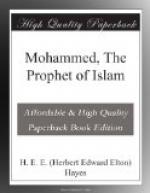He was evidently much perplexed by the divisions and controversies that existed within the Christian Church, and considered that the images and pictures then in use were little better than the idols of his own people. With no means of testing and verifying his knowledge, he accepted all that tended to enhance his own position, and his chief regret seems to have been his inability, in reply to the taunts of his enemies, to point to any element of the miraculous in his career. In the revelations, he frequently expressed views and opinions which flatly contradicted what he had formerly stated, and when challenged as to his inconsistency, defended it by claiming that it was not he who had changed his mind, but God, whose ways no man could question or understand!
In time, the position of the new sect became so intolerable that many were compelled to flee, and numbers went into Abyssinia, where they were well received. Mohammed himself, thanks to his relatives’ protection, could still afford to remain in Mecca. In spite of the opposition, his influence gradually increased, and was considerably strengthened by the conversion of Omar, a citizen famed for his skill in military strategy and courage. Not long afterwards, Khadijah, the prophet’s wife died. She had wielded a strong, healthy influence over her husband, and had cheered him on in times of discouragement and failure. Islam owes not a little to her life and influence, and were it more widely recognised, might possibly lead to an improvement of the position of the poor unfortunate daughters of the system, who are enslaved and degraded to a saddening degree. After Khadijah’s death, Mohammed took full advantage of the polygamous sanctions of Paganism, and even abused the privilege when it conflicted with his own inclinations. Margoliouth attempts to defend the many marriages on the ground of political expediency, which may be conceded in only a few cases. In most instances they were due to selfish desire and inordinate affection. Particularly is this true in the case of the prophet’s marriage with his adopted son’s wife, which was a gross violation of Arab law.
On the death of his protector, Mohammed was compelled to seek refuge elsewhere, but not before he had made inconsistent concessions to the pagan leaders. In these concessions he retreated entirely from the strong iconoclastic attitude he had hitherto adopted, going so far as to produce a revelation that claimed to reconcile the One True God to the gods of the Pagan pantheon. This compromise, no matter how wise and statesmanlike it may appear to be, clearly indicates the falsity of Mohammed’s claim, and enables us to estimate the value of his pretensions. His action was strongly condemned by many of his followers, and probably under the influence of their opinion, he produced an apologetic revelation abrogating the concession, and admitting it to have been a mistake!




